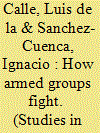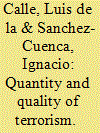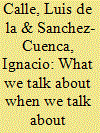|
|
|
Sort Order |
|
|
|
Items / Page
|
|
|
|
|
|
|
| Srl | Item |
| 1 |
ID:
140786


|
|
|
|
|
| Summary/Abstract |
This article analyzes the choice of tactics by armed groups. We claim this choice is largely determined by the capacity of the rebel groups to control territory. Groups that are not able to liberate territory remain underground and have to rely mainly on bombings. Groups with territorial control engage in guerrilla-like attacks in which there is a physical encounter with the enemy. This conjecture is tested and largely confirmed at three levels: a cross-sectional analysis of the distribution of tactics in 122 armed groups, using compositional data analysis; a geographical analysis of the distribution of tactics in the largest cities as opposed to the rest of the country; and a case study of Hezbollah.
|
|
|
|
|
|
|
|
|
|
|
|
|
|
|
|
| 2 |
ID:
120321


|
|
|
|
|
| Publication |
2013.
|
| Summary/Abstract |
We deal in this article with the relationship between ETA attacks and electoral support for Batasuna, its political wing. We show that the relationship is twofold, since the geographical distribution of electoral support for the terrorists affects the location of ETA attacks, but violence also influences electoral support for the terrorist cause. On the one hand, when ETA chooses a location for its attacks, it takes into account the electoral strength of Batasuna. Our results show that the higher the vote for Batasuna in a municipality, the more likely members of the security forces will be killed there. With regard to the targeting of civilians, the relationship is curvilinear. ETA kills civilians in municipalities that are polarized, where support for Batasuna falls short of being hegemonic. On the other hand, our results also show that ETA attacks have an effect on the size of its support community. When ETA kills members of the security forces, voters punish the Batasuna party electorally. In the case of civilians, it depends on the specifics of the various campaigns. We find that when ETA kills informers and drug-dealers, the vote for Batasuna increases. ETA's killing of non-nationalist politicians, however, decreases Batasuna's vote share.
|
|
|
|
|
|
|
|
|
|
|
|
|
|
|
|
| 3 |
ID:
102508


|
|
|
|
|
| Publication |
2011.
|
| Summary/Abstract |
This article presents a dataset of fatalities of domestic terrorism in Western European countries for the period 1965-2005. The Domestic Terrorism Victims (DTV) dataset, unlike others such as TWEED or GTD1, is based on local sources in each country and, consequently, it registers a higher number of killings. Measurement of the quantity of terrorism is therefore more accurate. The unit of observation is the fatality, not the attack, although the data can be transformed in terms of lethal attacks. Detailed information about each killing has been collected, making it possible to create new variables about the quality of violence: target selection, selectivity of the killings and their strategic aim. The ideology of the terrorists generates interesting variation in these three variables. The DTV is particularly suitable for hypothesis testing on the quantity and quality of terrorism.
|
|
|
|
|
|
|
|
|
|
|
|
|
|
|
|
| 4 |
ID:
113947


|
|
|
|
|
| Publication |
2012.
|
| Summary/Abstract |
The large-n literature on political violence has paid little attention to the distinction between insurgencies that control territory and those that do not. Territorial control has consequences for the lethality of the group, its pattern of recruitment and bargaining power. The main determinant of territorial control, we argue, is state capacity: while territorial insurgencies are more frequent in poor countries, nonterritorial ones tend to occur in countries with intermediate levels of development (rich countries are free of internal violence). The authors show that the relationship between development and nonterritorial violence is a concave one, using a panel for the period 1970-1997 that combines existing data sets on civil wars and the Global Terrorism Database 1. The authors also find that nonterritorial violence is more likely in democratic, old states. Population, rough terrain, and inequality have a similar impact on both types of conflict. The authors discuss to what extent territorial conflicts correspond to civil wars and nonterritorial ones to terrorism.
|
|
|
|
|
|
|
|
|
|
|
|
|
|
|
|
| 5 |
ID:
090919


|
|
|
|
|
| Publication |
2009.
|
| Summary/Abstract |
This article presents a cross-country comparison of the intensity of revolutionary terrorism in the developed world after the wave of mobilization in the late 1960s and early 1970s. Some countries were hit much more severely than others by this type of violence. The article tries to account for this variation with a new dataset of fatalities in 23 countries, for the period 1970-2000, based on local sources in six different languages. This dataset corrects in part the problems of underreporting that Jan Oskar Engene's TWEED dataset suffers from. The dependent variable is a novel index of the intensity of terrorism that combines the number of fatalities and the number of years in which the terrorist organization has killed people. The unit of analysis is the country in the whole period. Six broad hypotheses about the influence of economic development, social change, mobilization, welfare provision, population and political factors are tested in the article. The statistical results show that three variables are almost sufficient to explain variance: past dictatorship, high population and strong communist parties. Given that past dictatorship is the most important variable, three different mechanisms by which to understand its effect are suggested: the role of repression in countries with past political instability; dictatorship as a proxy for polarization; and past breakdowns as an indicator of the chances of overthrowing the system.
|
|
|
|
|
|
|
|
|
|
|
|
|
|
|
|
| 6 |
ID:
090908


|
|
|
|
|
| Publication |
2009.
|
| Summary/Abstract |
The hypothesis that terrorism often emerges when mass collective action declines and radicals take up arms to compensate for the weakness of a mass movement has been around for some time; however, it has never been tested systematically. In this article the authors investigate the relationship between terrorist violence and mass protest in the context of the Spanish transition to democracy. This period is known for its pacts and negotiations between political elites, but in fact, it was accompanied by high levels of terrorist violence and popular mobilization. To test the hypothesis, the authors have created two data sets, one on victims of terrorism and another on participation in demonstrations. The data clearly confirm that terrorism erupted in Spain when participation in demonstrations started to decline. This result sheds new light on the nonstructural conditions associated with the onset of terrorist violence.
|
|
|
|
|
|
|
|
|
|
|
|
|
|
|
|
| 7 |
ID:
107994


|
|
|
|
|
| Publication |
2011.
|
| Summary/Abstract |
There is no consensus in the literature about the nature of terrorism. The authors' main claim is that this is ultimately the result of the coexistence of two senses of the term, the action and the actor sense, which are not fully congruent. Rather than trying to advocate a specific conceptualization, the authors provide in this article a map of the different ways in which scholars talk about terrorism. They identify first the set of terrorist actions and the set of terrorist actors. Terrorist tactics are a variety of the power to hurt, based on the lack of military power. Terrorist groups are underground ones with no territorial control. When the two criteria meet, the core of terrorism exists: coercive violence perpetrated by underground groups. The ambiguity that surrounds terrorism is caused by two other possibilities: actors with some measure of territorial control adopting coercive tactics and underground actors adopting military tactics. Although it is not possible to remove this ambiguity in empirical research, scholars can at least identify it and analyze it. The authors illustrate the two senses of terrorism and their interaction by using the most comprehensive dataset on terrorist incidents, the Global Terrorism Database (GTD).
|
|
|
|
|
|
|
|
|
|
|
|
|
|
|
|
|
|
|
|
|